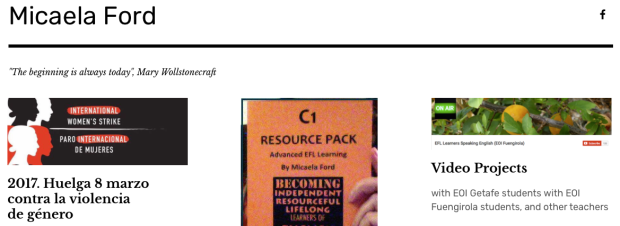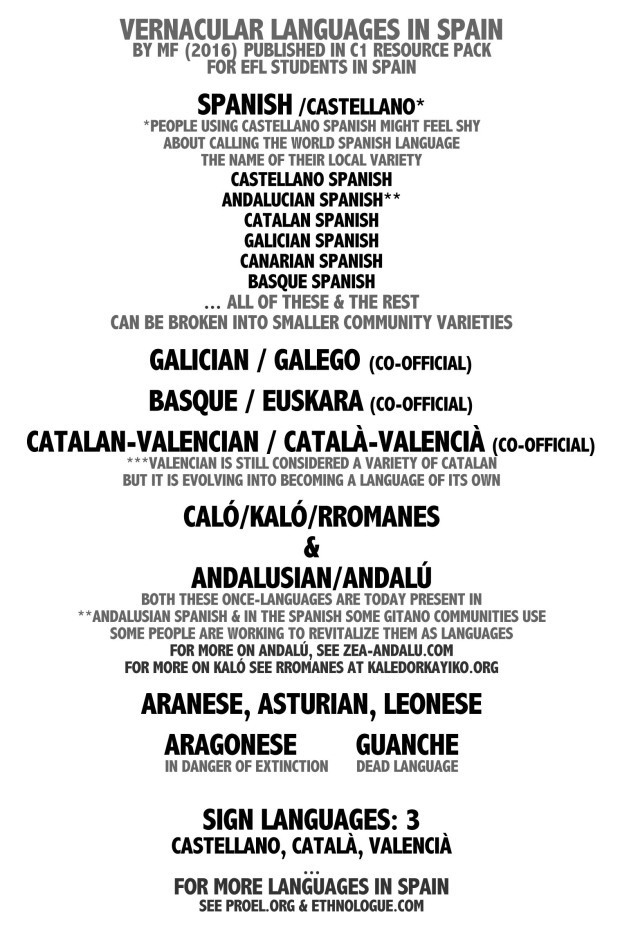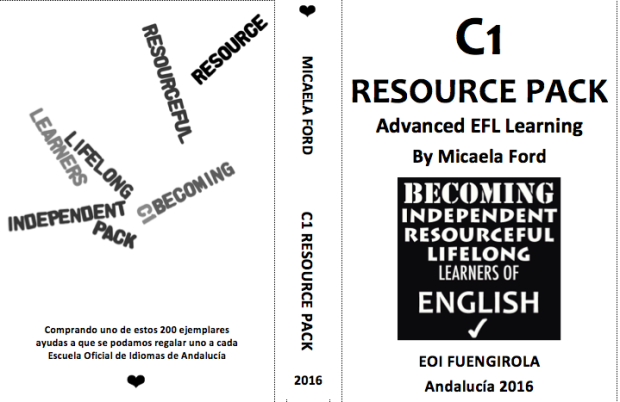I had a glance (because I took home the batch of papers by mistake), and felt happy to read your Evaluación al profesorado. As I kept reading, I found something that upset me. Let me share the journey!
But first of all, what’s most important:
Thanks for your Evaluation, everybody’s. ❤ It’s quite encouraging! And a relief, for its one of the things we teachers look forward to and fear (considering that this kind of thing in public education does not threaten our employment, meaning, it’s just simply for our information). About feedback on improvable things, thanks. I’ll take it into account.
(But don’t forget the main problem here is the student’s lack of time, not so much the lack of effort on the part of the teacher. In any case, we’re always eager to help.) Just remember what I always say: if you want to do something, just do it, or let me know, or ask us in class.
Refuting a point in Evaluación al profesorado. A little mistaken perception, in my view, or simply unfair or uninformed, is the following: should I really devote more time to “preparing the lessons”? Isn’t my work on this good enough? How can that be improved? How would you know that I need to prepare lessons more or better? I am interested in all the answers to these questions, or other comments, so you can leave it with Ana and it can be anonymous, of course.
Considering I work really hard for the C1 course (it seems it’s really hard to understand that women know well how to do their jobs when they don’t obey the Exam Culture mandate), this piece of criticism really hurt because it’s a 40% that believes that — 6 people/15 (And within this, a 20%, 2 of these people, believes I really need to prepare my lessons better. It shocks me — how can they feel they can assess this point in such way?
Let me explain: teachers are paid to devote 10 hours a week to working at home, that add to the hours they have to spend at school. Well, I devote much more to preparing and managing learning in C1 courses and lessons. I’m not that incompetent. I spent the summer writing out how you should be learning this year, to put a related example. You’re lucky because you’ve got it all written down, and if you miss lessons, you can still learn to learn in this course. This blog is totally out of my timetable, too. It’s Must material for this course, too. And it’s extra support to your two weekly lessons, it helps you if you miss lessons, helps peole keep in touch. Just imagine you only had our actual lessons. In this course you’re getting extra support all the time thanks to the internet. That’s related to preparation of the lessons. And it’s a precious present. Here I word our shared experiences, I keep a diary!! Do you know how many hours that takes, and mental effort? And how crucial it is to preparing lessons? Perhaps the problem is you are not doing your part and that I have to intervene far too much. This blog is full of info and resources (tons of hours behind that, to prepare that) people saying I don’t prepare my lessons well or enough obviously don’t appreciate or use.
Doesn’t it show I spend ZILLIONS OF HOURS preparing your lessons? Teachers laughed when I told them this morning why I was upset. All teachers know that teaching without a textbook takes much longer in preparation than using a textbook, that’s why it’s not common to find this kind of courses! They laughed because it was unbelievable!
Hours trying to figure out how to move on considering all the work people can’t do, and that I have to make up for? Because this course is about you doing, sharing things in class, and working together.
I thought I had managed to explain the attitude in independent and resourceful lifelong learning in the C1 Resource Pack. This course is about learning that. If people want to do reading comprehension exercises, that kind of work, there are tons of textbooks, websites, with exercises including exams. That’s not the aim of this course: we have one year to do what is supposed to be done in two, and the effort needs to last. You are not appreciating I prepare my lessons because your idea about what class should be about is traditional, and unfitting to what we’re doing here. Isn’t it obvious that I’m offering quality teaching and learning spaces and experiences? As a teacher I’m a facilitator of learning, not someone who improvises senselessley, undiscernenly. When I improvise, it’s all within a framework I have actually laid out before your eyes in various places, including class.
Have you read the C1 Resource Pack? Not even marketing works with women authors! The Pack systematizes — makes a very practical guide — 28 years of communicative teaching experience — in the setting of a country obsessed with a very narrow interpretation of evaluation and learning, that of “Exams” and Exam Culture (the murderer of curiosity and self-confidence, of teamwork, of community, as some people mentioned in our talk on Iceland). You are lucky to have this Resource Pack (and for free!).
So what’s your understanding of your role as a learner in interactive courses where we don’t have a textbook so you can choose topics and materials and share your world? Don’t I suggest sources, give guidelines for learning, try to coordinate your participation, encourage you to bring your world to class, to teamwork, don’t I design activities for you, based on what’s going on outside the classroom, in the world? Don’t I adapt to you, all the time, and follow the plans I annouce?
If you can’t see this, it’s OK, but you are wrong. I suggest you open your mind to this kind of learning, because it’s meaningful, communicative, and very rich and effective, long-lasting, at least it lasts more than exam training.
Do you know how many hours it takes a teacher to prepare courses and lesson that are FLEXIBLE and allow students’ freedom to select topics and offer contributions? If you want to do exercises, the internet is full of that. Training in exam format is included in this course, as you should know, in the month of March, because training in exam format just takes doing a few exercises in that format. If you want to believe private courses that charge you 100-300 euros a month for 6-8 months of exam training, well… the fact is exam training just takes doing few exercises, and that’s something you can do on your own, too. The harder thing is LEARNING ENGLISH at the advanced level. It’s funny how people tend to agree when it comes to criticizing the education system but then how very few people consider alternatives and are capable of enjoying them, of using them to further their knowledge and sharpen their skills.
Dear students in the 40% who believe I don’t prepare my lessons well or enough, please, reconsider. What you tell us teachers is not accurate in this point.
The May 68 movement expressed it very clearly: We have the systems we generate, meaning, what most people believe rules. I’m very fortunate to have a precious 60% thinking I do prepare my lessons well, very lucky to have a 60% understanding this, because it’s not a kind of understanding that prevails in society, so good at harming good things and considering bad things inevitable.
If someone did not fill out/in the Evaluación al profesorado, you can ask me for the sheet next day, because DOFEI has extended the deadline. I promise I won’t have a look! 😀 DOFEI will analyze all the sheets and hand me the final report.
Well, for a good rest now! I refuse to prepare anything else for you this week! 😀 I hope the 60% will also make the most of what is probably proper learning for the 40% who can’t see how hard their teacher works for them: Exam Training Month next March! 😀
Enjoy your free time and your English! ❤



 Lucía gave a talk on an Irish ring in a true storytelling mode, with great work on language. I’d like to send you all of our support for your upcoming mission! ❤ ❤ ❤
Lucía gave a talk on an Irish ring in a true storytelling mode, with great work on language. I’d like to send you all of our support for your upcoming mission! ❤ ❤ ❤ Today we had two wonderful OPs: on a mathematician, Milena Marich (who married Einstein /ain-stain/, by Luz, and on Teaching, by María José. I asked both students to record their final version after the feedback they got in class, for their Speaking File, and to send me that final version for doublechecking. I also invited them to exploit this good work in a written exercise of their choice. We should publish Luz’s on the Herstory blog! As both students used audio material to learn to improve their English (Luz a documentary and MJosé a TED Talk), I would like to ask them to post it on this blog, so other students can also have some follow-up on what we learned/learnt today from their talks in class.
Today we had two wonderful OPs: on a mathematician, Milena Marich (who married Einstein /ain-stain/, by Luz, and on Teaching, by María José. I asked both students to record their final version after the feedback they got in class, for their Speaking File, and to send me that final version for doublechecking. I also invited them to exploit this good work in a written exercise of their choice. We should publish Luz’s on the Herstory blog! As both students used audio material to learn to improve their English (Luz a documentary and MJosé a TED Talk), I would like to ask them to post it on this blog, so other students can also have some follow-up on what we learned/learnt today from their talks in class.